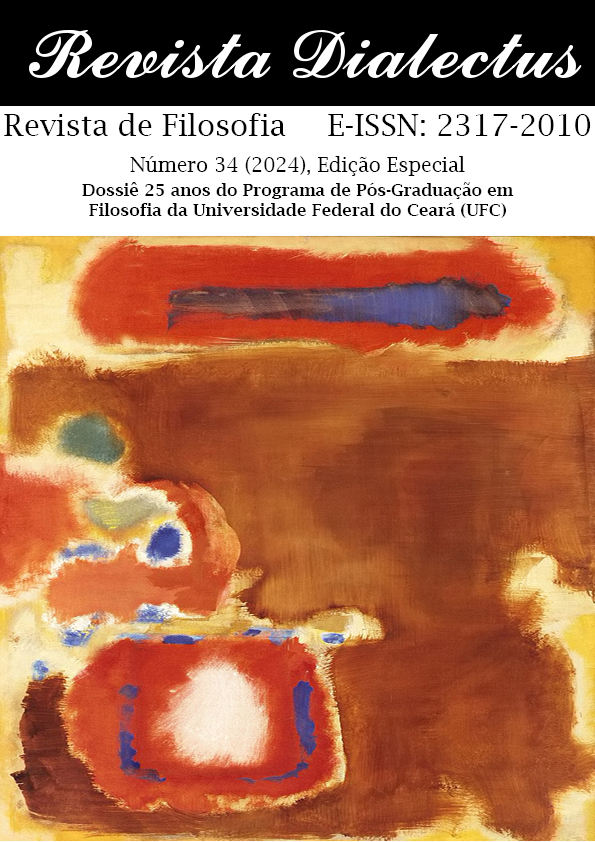UM BREVE TRAJETO FILOSÓFICO COM OS RACIONALISTAS CONTEMPORÂNEOS
DOI:
https://doi.org/10.30611/2024n34id94582Keywords:
Racionalismo, Linguagem, Intencionalidade, Máquina, Dupla determinaçãoAbstract
O objetivo deste artigo é esboçar um perfil do pensamento racionalista contemporâneo. A tarefa é realizada por meio da leitura de textos selecionados de três autores: J. Haugeland, D. Dennett e R. Brandom. E o trabalho não é feito de uma só vez, mas se desenrola em três etapas. Primeiro, a leitura de Haugeland nos dá uma caricatura do racionalismo: a máquina que joga xadrez. Daí, apoiando-se nesse esboço, a leitura de Dennett amplia os nossos horizontes, abarcando a intencionalidade das atividades práticas. Tomando esse desenho como base, a leitura de Brandom adiciona uma nova dimensão semântica ao esquema: a normatividade. Mas, ao final do trabalho, o que nós obtemos não é uma figura com linhas bem definidas – que demarca e caracteriza o pensamento racionalista contemporâneo. Isso acontece porque, durante todo o trajeto, nós alternamos as tentativas de examinar as suas fronteiras a partir de dentro e a partir de fora – examinando aquilo que os autores têm a dizer e aquilo que eles não dizem; as suas ideias e as limitações do seu ponto de vista. Assim, ao mesmo tempo em que vamos produzindo o nosso retrato, também vamos jogando luz no plano de fundo, examinando aquilo que precisa estar lá para que o racionalismo possa operar. Finalmente, concluímos o artigo apontando para esse elemento que tornaria a história mais completa, utilizando o conceito de dupla determinação.
References
BRANDOM, Robert. Articulating Reasons: An Introduction to Inferentialism. Cambridge: Harvard University Press, 2000.
BRANDOM, Robert. Making It Explicit: Reasoning, Representing, and Discursive Commitment. Cambridge: Harvard University Press, 2001.
BRANDOM, Robert. Between Saying and Doing: Towards an Analytic Pragmatism. Oxford: Oxford University Press, 2008.
DENNETT, Daniel C. Three kinds of intentional psychology. In: HEALEY, R. A. (org.), Reduction, Time and Reality: Studies in the Philosophy of the Natural Sciences. Cambridge: Cambridge University Press, 1981.
DENNETT, Daniel C. Cognitive wheels: the frame problem of AI. In: Hookway, C. (ed.), Minds, Machines and Evolution. Cambridge: Cambridge University Press, 1984, p. 129–150.
DENNETT, Daniel C. Real Patterns. In: The Journal of Philosophy, v. 88, n. 1., Jan. 1991, p. 27-51.
DENNETT, Daniel C. True Believers: The Intentional Strategy and Why It Works. In: HAUGELAND, John. Mind Design II. Cambridge: The MIT Press, 1997, p. 57-79.
DENNETT, Daniel C. The Intentional Stance. Cambridge: The MIT Press, 1998.
DENNETT, Daniel C.; HAUGELAND, John. Review of Having Thought: Essays in the Metaphysics of Mind. The Journal of Philosophy, v. 96, n. 8, Ago. 1999, p. 430-435.
HAUGELAND, John. Semantic Engines: an introduction to mind design. In: HAUGELAND, John. (ed.) Mind Design. Cambridge: The MIT Press, 1981, p. 34-50.
HAUGELAND, John. Review of Brainstorms by Daniel C. Dennett. Noûs, v. 16, n. 4, Nov., 1982, p. 613-619.
HAUGELAND, John. Artificial Intelligence: The Very Idea. Cambridge: MIT Press, 1996.
PEACOCKE, C. Three principles of rationalism. European journal of philosophy, v. 10, n. 3, 2002, p. 375–397.
RADFORD, L. On Inferentialism. Mathematics education research journal, v. 29, n. 4, 2017, p. 493–508.
SELLARS, Willfrid. Empiricism and The Philosophy of Mind. Cambridge: Harvard University Press, 1997.
WEISS, Bernhard; WANDERER, Jeremy. (Orgs.) Reading Brandom: On Making It Explicit. London: Routledge, 2010.
WITTGENSTEIN, Ludwig. Philosophical Investigations. [Trans. G. E. M. Anscombe, P. M. S. Hacker; Joachim Schulte] 4th ed., Oxford: Blackwell Publishing Ldt., 2009.
Downloads
Published
Issue
Section
License
Copyright (c) 2024 Carlos Eduardo Fisch de Brito, Ralph Leal Heck

This work is licensed under a Creative Commons Attribution-NonCommercial-NoDerivatives 4.0 International License.
Authors who publish in this journal agree to the following terms:
- Authors retain the copyright and grant the journal the right of first publication, with the work simultaneously licensed under the Attribution-NonCommercial-NoDerivatives 4.0 International (CC BY-NC-ND 4.0) License, which allows the non-commercial sharing of work, without modifications and with acknowledgment of authorship and initial publication in this journal.
- Authors are authorized to take additional contracts separately, for non-exclusive distribution of the version of the work published in this journal (eg publish in institutional repository or as a book chapter), with acknowledgment of authorship and initial publication in this journal.
- Authors are allowed and encouraged to publish and distribute their work online (eg in institutional repositories or on their personal page) at any point before or during the editorial process, as this can generate productive changes as well as increase the impact and citation of published work (See The Free Access Effect).



















